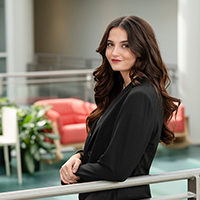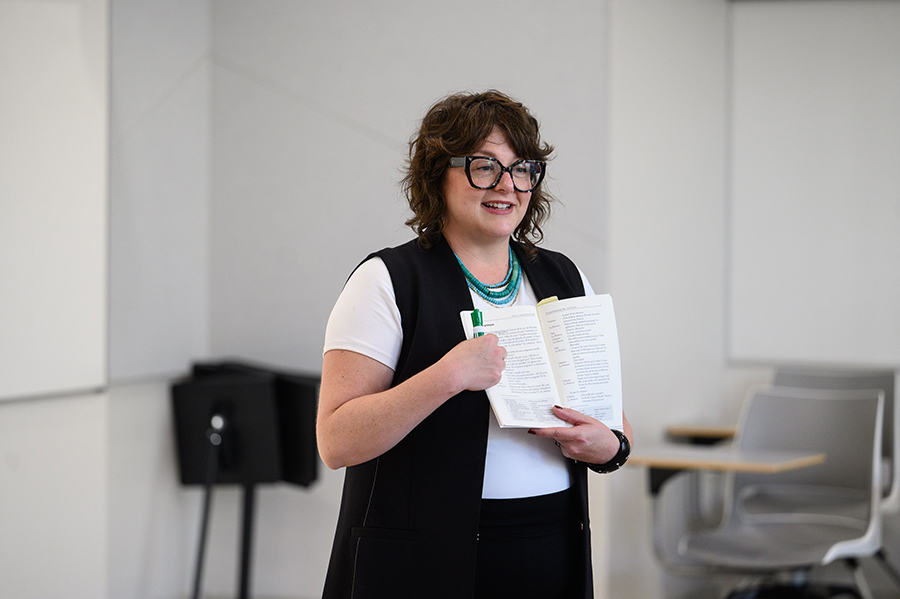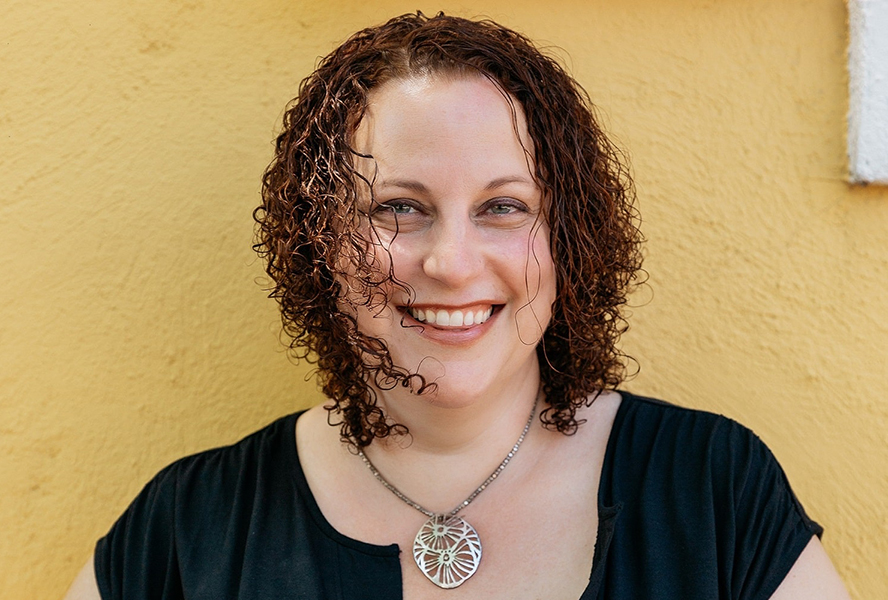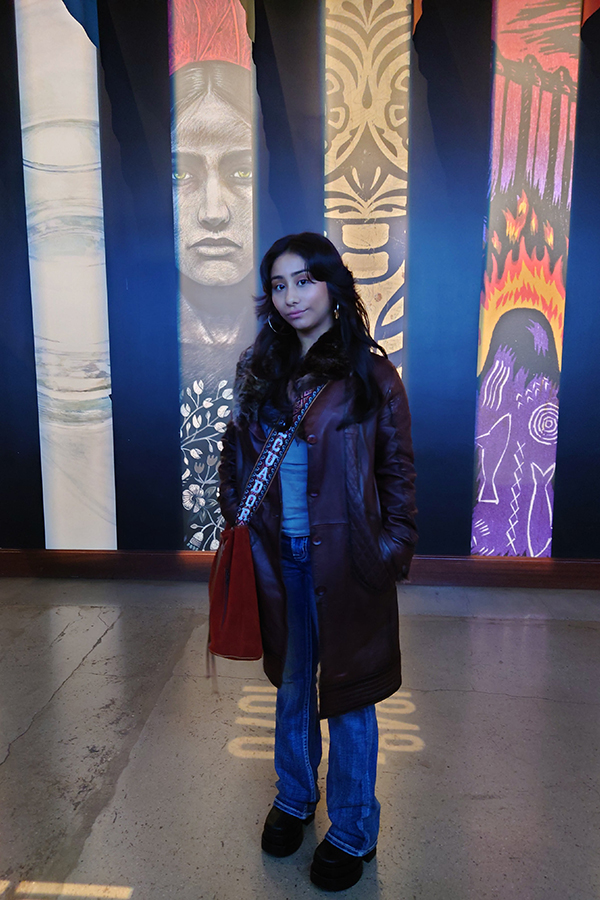The Garden: Volume Nine
Uniquely Connected & Thriving Together at Dietrich College
In This Issue: Call for Nominations: Dietrich College Staff Community Excellence Award Ι Student Spotlight: Melina Castillo Ι Fall 2024 Featured Courses: ADDvocates and American Political Divides and Great Debates Ι Inside Family Weekend Research Presentations Ι Faculty Spotlight: Candace Skibba Ι Alumni Spotlight: Kerri Ullucci
A Message from Richard Scheines
 Dear Dietrich Students, Faculty and Staff,
Dear Dietrich Students, Faculty and Staff,
Whether embarking on a road trip with friends, cooking and eating outside or reading something mindless but fun, I hope you are planning to embrace the joys of summer and rejuvenate in all ways large and small!
This summer, a committee of our community members will begin reviewing our diversity, equity and inclusion strategic plan to identify opportunities to increase our impact. We invite you to share your thoughts and suggestions on topics, ideas, strategies and issues that our committee should consider during this review. Your feedback is not just important, it's crucial in refining our practices and interactions as we strive to deepen our understanding of diverse perspectives and formulate strategies that will meet the needs of our community.
Please review our DEIB strategic plan and provide feedback.
I am genuinely excited about the journey ahead and I have full confidence in our collective ability to create lasting, positive change. Your contributions are what make this possible. In the meantime, may your summer be filled with joy.
In community,
Richard Scheines
Bess Family Dean, Dietrich College of Humanities and Social Sciences
Call for Nominations: 2024 Dietrich College Staff Community Excellence Award
The Dietrich College Staff Community Excellence Award is presented to staff who regularly go above and beyond to create a more inclusive, just and welcoming environment within the college and our surrounding community.Nominees will embody the values of diversity, equity and inclusion by providing leadership, coordinating diversity efforts, creating and enhancing inclusive climates and connecting the larger community with their DEI efforts.
While nominations are accepted on a rolling basis throughout the year, the deadline for a nominee to be considered for 2024 is Friday, Aug. 23.
Learn more about the award and submit a nomination
Student Spotlight: Melina Castillo's Journey Through the ADDvocates Course
Melina Castillo, a senior and Tartan Scholar, is a force to be reckoned with. Engaged in various leadership roles, from being the president of the Spanish and Latino Students Association to serving as the head driver of the Spirit Racing Systems' buggy team, Castillo's commitment to advocacy and social justice is evident in her multifaceted involvement on campus. Recently, Castillo embarked on a unique journey by participating in the fall 2023 ADDvocates course, which provided her with an enriching experience in understanding and addressing discrimination.
ADDvocates: Anit-Discrimination Dialogue for Social Justice, is a joint program between CMU-Pittsburgh and CMU-Qatar. Co-taught by CMU-Qatar’s Ezzohra Moufid, lecturer of Arabic Studies and Annette Shoba Vincent, associate dean for diversity and climate and associate teaching professor, and Ayana Ledford, Dietrich College’s associate dean for diversity, equity and inclusion, the ADDvocates course examined concepts such as structural inequality and the ethics of equity and justice through a global lens.
Inspired by Family and Community
Hailing from Los Angeles and raised by immigrant parents from Ecuador and Belize, Castillo's background has shaped her perspective on social issues. Castillo's dedication extends beyond academics to supporting her family and her community. She spends her time not only studying but also caring for her younger sister with Down syndrome and engaging in monthly DEI roundtables with underrepresented student leaders and CMU Vice President, Gina Casalegno.
When asked about her motivation to enroll in the ADDvocates course, Castillo highlighted her preference for courses related to social advocacy and colonial history. The interdisciplinary nature of the course, coupled with its focus on discrimination against Arab communities, piqued her interest. She appreciated the opportunity to reflect on the roles students and leaders can play in combating discrimination, especially across campuses in Pittsburgh and Qatar.
Sparking Conversations About Equity
Throughout the course, Castillo found herself engaged in thought-provoking discussions and activities. She particularly enjoyed the focus on real-world examples, such as a guest speaker who shared insights on making snorkeling accessible for people with disabilities. These discussions prompted Castillo to explore connections between resource management, discrimination and contemporary issues like housing affordability.
Collaborating with students from CMU-Qatar, Castillo worked on a final presentation that addressed funding disparities among student organizations. Drawing on her own experiences leading the Spanish and Latino Students Association, Castillo highlighted the challenges of navigating budget cuts and misconceptions about cultural organizations. Together, they advocated for transparency and accountability in resource allocation, sparking conversations about representation and equity within university structures.
Reflecting on her experience, Castillo expressed a desire for the course to delve deeper into interdisciplinary topics and extend beyond a single semester. She emphasized the importance of integrating ethics, history and culture into discussions about modern technology — a realm often dominated by narratives of warfare.
Castillo also spoke highly of the instructors for this course. She appreciated their openness to diverse perspectives and active engagement with students. Ledford and her colleagues from CMU-Qatar facilitated discussions that encouraged students to challenge their own preconceived notions and connect course materials to their personal experiences. Moreover, the instructors provided valuable feedback on assignments and journaling activities, creating a supportive learning environment conducive to growth and exploration.
Looking Ahead: Sustainable Support for All
Looking ahead, Castillo plans to leverage her engineering skills to contribute to community-oriented projects and solutions. Inspired by a lecture on designing accessible technologies, she aspires to work in a space where she can understand and address the needs of diverse communities in a sustainable manner.
Castillo's journey through the ADDvocates course exemplifies the transformative power of education in fostering advocacy and social change. As she continues to advocate for inclusivity and equity, Castillo embodies the spirit of student leadership and activism on campus and beyond.
Fall 2024 Featured Courses
ADDvocates: Anti-Discrimination Dialogue for Social Justice
A mini-one course for students with an interest in social justice, ADDvocates is a joint program between CMU-Pittsburgh and CMU-Qatar examining concepts such as structural inequality and the ethics of equity and justice through a global lens.
Course Information
Course Number: 99-262
Fall 2024
Mini-One
Monday & Wednesday: 9-10:15 a.m. (virtual with CMU-Qatar students)
Register for ADDvocates
American Political Divides and Great Debates
This is dynamic course delves into the complexities of political polarization in the United States, actively engaging students in the analysis of some of the most divisive and challenging issues facing the nation today and offering students a platform to understand the roots of American political divides and develop skills essential for civic engagement and discourse.
Course Information:
Course Number: 84-309
Professor: Jonathan Cervas
Tuesday/Thursday 2-3:20 p.m.
No prerequisites
Register for American Political Divides and Great Debates
Marissa Pekular
 Marissa Baldauf Pekular (DC 2024) earned her degree in International Relations and Political Science and Professional Writing. Her passions for professional writing, public policy and equitable development have been especially keen since interning at the U.S. Department of Commerce and U.S. Senate. Pekular's senior honors thesis investigated the national maternal health crisis in the wake of the Supreme Court's decision to overturn Roe v. Wade.
Marissa Baldauf Pekular (DC 2024) earned her degree in International Relations and Political Science and Professional Writing. Her passions for professional writing, public policy and equitable development have been especially keen since interning at the U.S. Department of Commerce and U.S. Senate. Pekular's senior honors thesis investigated the national maternal health crisis in the wake of the Supreme Court's decision to overturn Roe v. Wade.
What made you choose to present at Family Weekend?
I was excited to present my honors thesis at Family Weekend because I wanted to take advantage of the opportunity to further explore my thesis research through meaningful conversations. I am incredibly impassioned by my area of research and love talking about it.
Do you have any key takeaways on Family Weekend itself? Any highlights or issues you faced?
The poster session was extremely helpful to my continued research and work. Not only did I get to present my preliminary findings and practice speaking on this material, but I also had insightful conversations with many different people.
What are your future plans (related or unrelated to your presentation)?
I am looking forward to pursuing a career in birth justice and health equity after graduation.
Veronica Pimenova
 Veronica Pimenova is a rising junior in Information Systems with a minor in Human-Computer Interaction. During summer 2023, Pimenova was a marketing and machine learning intern at the bike safety company Velo A.I. The company specializes in an A.I. powered smart technology for bike safety, known as Copilot, which Pimenova helped launch. Her presentation at Family Weekend was centered around this internship experience and how it has impacted her current plans at Carnegie Mellon.
Veronica Pimenova is a rising junior in Information Systems with a minor in Human-Computer Interaction. During summer 2023, Pimenova was a marketing and machine learning intern at the bike safety company Velo A.I. The company specializes in an A.I. powered smart technology for bike safety, known as Copilot, which Pimenova helped launch. Her presentation at Family Weekend was centered around this internship experience and how it has impacted her current plans at Carnegie Mellon.
What made you choose to present at Family Weekend?
I chose to present at Family Weekend to have the opportunity to gather everything I did over the summer and practice my presentation skills in front of a group of people. Also, it was a nice opportunity to talk to non-technical people about my technical (machine learning) experience, as sometimes there is some difficulty with understanding between groups (technical or non-technical people).
Do you have any key takeaways on Family Weekend itself? Any highlights or issues you faced?
As for key takeaways, I think it was a really great experience to see other projects and what kind of work students around me are doing. The whole presentation went well and I'm glad I could be a part of it!
What are your future plans (related or unrelated to your presentation)?
My future plans are to continue doing accessibility research at CMU's Software and Societal Systems department, where I am building a more inclusive learning platform for individuals with disabilities to learn to code. Regarding my Velo A.I. internship, I hope to use these experiences in developing machine learning models for my research project.
Faculty Spotlight: Candace Skibba
New Research Lab for Undergraduate Students
 Candace Skibba, associate teaching professor of Hispanic Studies and associate director of the Master’s in Applied Second Language Acquisition in the Department of Languages, Cultures & Applied Linguistics, has created a research lab tailored to undergraduate students. Through this lab, Skibba has developed a research platform for Carnegie Mellon University students that fosters inclusive teaching methods and challenges conventional teaching norms.
Candace Skibba, associate teaching professor of Hispanic Studies and associate director of the Master’s in Applied Second Language Acquisition in the Department of Languages, Cultures & Applied Linguistics, has created a research lab tailored to undergraduate students. Through this lab, Skibba has developed a research platform for Carnegie Mellon University students that fosters inclusive teaching methods and challenges conventional teaching norms.
With a research portfolio rooted in understanding normalcy and the construction of otherness, Skibba's journey in academia is marked by a profound interest in exploring human representations of the body and dismantling societal constructs of difference. Above all, Skibba's work promotes inclusive teaching methods. Her research delves into systems that contribute to the marginalization of certain identities, overlapping with racial understanding, anti-racist pedagogy, disability studies and LGBTQ+ studies. Ultimately, the aim of her research is to push back against structures that perpetuate inequality and redefine what is considered successful within a classroom setting. A key aspect Skibba's approach is the exploration of how bodies and identities interact within a classroom. Skibba advocates for more equitable interactions among students and emphasizes the need for adaptable teaching practices that align with the dynamic nature of education in the 21st century.
Reshaping the Narrative
Prior to creating the research lab last year, Skibba's commitment to inclusivity was evident in collaborative efforts, such as co-authoring an anthology on teaching gender-based violence. The anthology explores trauma-informed pedagogy and care, drawing inspiration from influential theories like Paulo Freire’s Pedagogy of the Oppressed. Skibba emphasizes the importance of treating topics equitably and with emotional intelligence, ensuring that the learning environment remains progressive and inclusive.
In response to the challenges posed by the COVID-19 pandemic, Skibba also launched a podcast on pedagogy which explores the impact of teaching methods on students and strives to understand which approaches are genuinely effective from their perspective. Through engaging conversations with diverse guests, including a circus performer teaching through performance, the podcast seeks to break down the stigma surrounding who holds authority in teaching. Skibba's innovative approach includes reshaping the narrative around traditional teaching roles.
Emphasizing Student Voices
At Skibba's research lab, Amanawit (Amy) Assefa serves as the primary bibliographical researcher. A rising senior studying International Relations and Politics, her work in the lab is structured around identifying institutional challenges in teaching methods. Assefa is helping Skibba lead the lab until May, after which the lab plans to expand by hiring more student researchers and engaging SURG/SURF fellows.
"Ideally, a year from now, there would be qualitative data that are student-designed and student-facilitated … for being able to create models [that] apply to other institutions [and] test methods in classrooms," Skibba said.
The data from Skibba's research lab will be quite open, from collecting biofeedback data to design or architectural data (such as spatial designs for making people more comfortable in an institutional setting). Thus, the lab hopes to facilitate conversations across campus with student-led data on teaching methods. Assefa has played a major role in the lab’s current expansion as a lead researcher.
Skibba's work could not be complete without collaborating with and emphasizing student voices. She envisions the lab as a space where students engage in research and conversations about inclusivity in the classroom, creating a rich tapestry of safe and comfortable interactions that contribute to students’ own identity work. By challenging traditional norms, prioritizing inclusivity and amplifying student voices, Skibba’s lab has created a dynamic space where teaching and learning transcend conventional boundaries. The impact of Skibba’s work can extend far beyond the classroom, inspiring a generation of educators to rethink their approaches and embrace a more equitable and inclusive pedagogy.
Alumni Spotlight: Kerri Ullucci
 Kerri Ullucci (DC 1997) has spent more than 20 years working on race, equity and education issues in K-12 settings. Looking back, Ullucci, a History Department alumna, attributes the roots of her equity-focused career to her years at Carnegie Mellon.
Kerri Ullucci (DC 1997) has spent more than 20 years working on race, equity and education issues in K-12 settings. Looking back, Ullucci, a History Department alumna, attributes the roots of her equity-focused career to her years at Carnegie Mellon.
While a student in the History Department, Ullucci met Susan Ambrose, former senior vice provost for undergraduate education and experiential learning and professor of education and history. Ambrose taught a class on race in the U.S., and it was in that class that a seed was planted. Through this experience, Ullucci came to understand the pivotal nature of race in the U.S. and see a role for herself in this work. She spent much of her work-study hours in the Division of Student Affairs, where she helped facilitate the sexual assault peer educators. Through this experience, she had her first taste of leadership and went on to spearhead the first women’s conference at CMU, Mosaic. Her education in the Department of History taught her how to analyze, research, find patterns and look for cause and effect. Years in Student Affairs helped to shape her sense of advocacy, see and respond to a problem and find like-minded folks to engage with along the way.
Putting Lessons into Practice
More than 25 years later, Ullucci is a professor of diversity and equity in education at Roger Williams University in Bristol, Rhode Island, where she prepares young teachers to teach and works with schools and districts on pressing equity issues. Ullucci earned her bachelor’s degree from Carnegie Mellon, her master of arts in teaching from the University of Pittsburgh and her Ph.D. in urban schooling from the University of California, Los Angeles (UCLA), studying under Tyrone Howard, professor of education. Her research interests center on race and poverty issues in schooling and the development of culturally relevant teaching practices. Her publications span several journals, including Urban Education, Race, Ethnicity and Education and Teacher Education Quarterly. Her book, co-authored with Joi Spencer, Anti-Blackness at School: Creating Affirming Educational Spaces for African American Students,” was published in 2022, through Teachers College Press.
Looking back on more than 20 years of teaching, it is clear how indelibly CMU shaped Ullucci’s trajectory. She appreciates the mentorship she received, the leadership opportunities which propelled her on her path and the fabulous faculty who supported a curious first-generation woman and helped her find her way.
